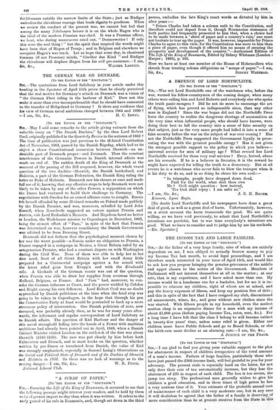(TO THE EDITOR OP THE "SPECTATOR."( ,—May I add some
remarks to the article giving extracts from the valuable essay on "The Danish Duchies," by the then Lord Robert Cecil, originally published in the Quarterly Review in the autumn of 1863? The time of publication was just previous to the ill-fated Constitution Act of November, 1863, passed by the Danish Rigsdag, which had as its abject a closer Constitutional connexion between Sleswick—an un- deniable part of Denmark proper—and Denmark. Thus the constant interference of the Germanic Powers in Danish internal affairs was made an end of. The sudden death of the King of Denmark at the moment of the passing of tho Bill reopened, however, the whole vexed question of the two duchies —Sleswick, the Danish borderland, and Holstein, a part of the German Federation, the Danish King ruling the latter as Duke of Holstein. Bismarck saw his chance at once and made fall use of it, knowing that any effective steps to help Denmark were not laxly to be taken by any of the other Powers, a supposition on which the Danes had ventured to build their challenge to Germany. The negotiations with Sweden for an armed alliance came to naught. Russia Mt herself offended by some ill-timed remarks on Poland made publicly by the Danish Premier, and was, moreover, rebuffed by Lord John Russell, when Nesselrode suggested an entente against Prussia and Austria, vide Lord Redesdale's Memoirs. And Napoleon fared no better ha London, the Wodehouse mission to Copenhagen in December, 1863, being the utmost effort of "Pam," in spite of the fact that Prussia was determined on war, however conciliatory the Danish Government was advised to be from Downing Street.
Denmark did not fathom that the psychological moment chosen by her was the worst possible—a Russia under an obligation to Prussia, a France engaged in a campaign in Mexico, a Great Britain ruled by an ortogenarian Premier, who had a constant dispute on with Washington during the Civil War. None of them was able to help her in her dire need, least of all Great Britain with her small Army little prepared for a Continental campaign against a foe armed with the latest rifled guns from Krupp's and with the Ztindnadel rifle. A blockade of the German coasts was out of the question, when Prussia was able to draw her supplies from overseas through Holland, Belgium, or France. And " Pam " had, moreover, to con- sider the German influence at Court, and the power wielded by Cobden and Bright among his own followers. Lord Robert Cecil was no doubt approached by Danish politicians at the time when the fatal step was ping to be taken in Copenhagen, in the hope that through his pen the Conservative Party at least would be persuaded to back up a more 'Strenuous policy of intervention. One Danish politician of note, now deceased, was probably already then, as he was for many years after- wards, the informant and regular correspondent of Lord Salisbury as to Danish affairs. The question of Kid Harbour and the danger of this naval stronghold falling into the hands of a Power with maritime ambitions had already been pointed out in April, 1848, when a Danish Cabinet Minister visited London on the outb:elk of the first war about Sleswick (1848-1850). The ease was put clearly by him before both Palmerston and Disraeli, and in most books on the question, whether written by pro-Danes or translated from Danish, the value of Kiel was strongly emphasized, especially in Samuel Laing's Observations on the Social and Political State of Denmark and of the Duchies of Sleswick and Holstein in 1851. So there was no lack of warnings as to the






























 Previous page
Previous page